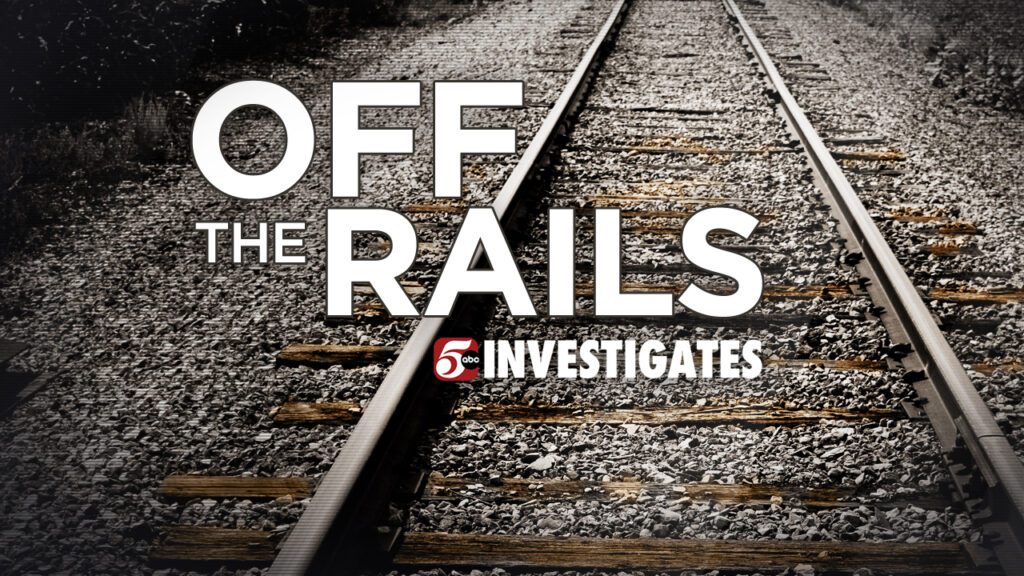Despite defects, misconduct and secret recordings, BNSF insists safety is the ‘center of everything we do’
As a fifth-generation railroader, John Mozinski has a front-row seat at Burlington Northern Santa Fe (BNSF) – but he says that view is not what it used to be.
“The railroad should be concerned. The public should be concerned. We’re concerned,” he said.
Mozinski is general chairman of Burlington Northern System Federation (BUNOR), representing nearly 2,000 union workers from Wisconsin to the West Coast.
He’s been sounding the alarm about safety for years, blasting the railroad for cutting inspections and staff long before the fiery BNSF derailment in Raymond, Minnesota last spring.
Mozinski previously said the railroad is “playing Russian roulette with the public’s safety.”
The union’s claims come on the heels of a series of reports by 5 INVESTIGATES that revealed a history of defects on the railroad, misconduct in court, and explosive evidence in a whistleblower retaliation case.
“The manpower is not high enough out here, and they are not inspecting enough out here,” Mozinski said in an interview with 5 INVESTIGATES. “It is a matter of time before derailments. We’ve been lucky.”

The railroad disputed Mozinski’s claims in an email to 5 INVESTIGATES last week.
“We are inspecting more track mileage than ever before, and plan to inspect more with the use of technology,” said Kendall Sloan, a BNSF spokesperson.
Sloan cites a “significant increase” in its geometry cars that analyze track conditions along with newer technology that uses AI to detect and report joint defects that transmit data “for quick action.”
“Most of our primary corridors through Minnesota are visually inspected at a higher frequency than minimum regulations,” Sloan said.
But court records paint another picture.
Secret recordings
In 2021, former BNSF track inspector Don Sanders won a wrongful termination lawsuit against the railroad, saying they fired him in retaliation for reporting too many track defects.
Among the evidence in the case: secretly recorded calls between Sanders and his boss.
“All I can say is I just need your help right now to keep my ass from getting fired,” said Sanders’ supervisor on one of the calls.
“I understand. So, in order to keep you from getting fired, I need to just look the other way?” Sanders replied.
“No. We just need to have a conversation,” the supervisor said.
In another call, Sanders’ supervisor criticized him for reporting certain defects that would slow down trains, arguing that we have “bigger fish to fry.”
BNSF is still appealing the more than $2 million verdict.
Mozinski said the Sanders case offers a rare glimpse at retaliation within the railroad, like how managers are motivated to delay fixing problems. He hoped it would be a wake-up call.
“I wish the railroad would take accountability,” he said.
National conference
Late last year, the National League of Cities hosted a round-table discussion in Atlanta with the major railroads, the Federal Railroad Administration, and mayors and council members from around the country.
As a credentialed member of the press, 5 INVESTIGATES approached the BNSF representative after the meeting to ask about the company’s safety record, the Don Sanders case, and claims made by the union.
“Safety is at the absolute center of everything we do at BNSF,” said Jeanelle Davis, Executive Public Affairs Director at BNSF for Oklahoma and Texas, who represented the railroad at the national conference.
BNSF later requested this interview be removed from the story, claiming 5 INVESTIGATES “ambushed” their employee who has “no direct connection to anything in Minnesota. (The reporter for this story notified BNSF that he would be in attendance and asked for an interview in advance. The railroad did not respond prior to the reporter approaching Davis in Atlanta.)
During the interview, 5 INVESTIGATES also asked if Davis had heard the tapes in the Don Sanders case.
“Whether I’ve heard them or not, at the end of the day, we do everything that we can on our end to try to ensure a safe railroad, and that’s through training of our employees, that’s through routine maintenance and inspections of our rail,” she said.
BNSF later provided a series of internal company statistics they say show their commitment to safety – including that in the last seven years, derailments caused by track-related problems dropped by 73% in the Twin Cities area.
The NTSB found that a broken rail caused the derailment in Raymond last March, spilling ethanol and leading to the emergency evacuation of half of the town.
During the meeting in Atlanta, railroad safety remained a key theme as the industry neared the one-year mark of the Norfolk Southern disaster in East Palestine, Ohio.
“I can tell you the FRA is looking at safety on a daily basis,” FRA Administrator Amit Bose told those in attendance. “There is absolutely more work to do on the safety front.”
The agency repeatedly declined requests by 5 INVESTIGATES to interview Administrator Bose at the conference, citing a busy schedule.